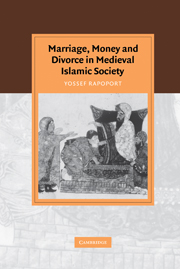Book contents
- Frontmatter
- Contents
- Acknowledgments
- Glossary
- List of abbreviations
- Introduction
- Chapter 1 Marriage, divorce and the gender division of property
- Chapter 2 Working women, single women and the rise of the female ribāṭ
- Chapter 3 The monetization of marriage
- Chapter 4 Divorce, repudiation and settlement
- Chapter 5 Repudiation and public power
- Conclusion
- Bibliography
- Index
- Cambridge Studies in Islamic Civilization
Chapter 5 - Repudiation and public power
Published online by Cambridge University Press: 15 June 2009
- Frontmatter
- Contents
- Acknowledgments
- Glossary
- List of abbreviations
- Introduction
- Chapter 1 Marriage, divorce and the gender division of property
- Chapter 2 Working women, single women and the rise of the female ribāṭ
- Chapter 3 The monetization of marriage
- Chapter 4 Divorce, repudiation and settlement
- Chapter 5 Repudiation and public power
- Conclusion
- Bibliography
- Index
- Cambridge Studies in Islamic Civilization
Summary
In Mamluk society, divorce was not merely a domestic matter between a husband and a wife, nor even a dispute between two families. The absolute right of husbands to dissolve the marriage contract at will, together with the absolute right of a master to manumit his slave, were the ultimate symbols of patriarchal authority. In a society in which public status was seen to be derived from power over women, slaves and children, men were expected to use their patriarchal privileges to bolster their commitments in the public sphere. They did so through the legal mechanism of the oath on pain of divorce, a form of oath that makes repudiation of one's wife contingent on the non-fulfillment of the sworn undertaking. Since oaths could not always be respected and promises had to be broken, the violation of divorce oaths was an additional cause of the high divorce rate in Mamluk society. These separations were not directly initiated by either husband or wife, but were rather the result of men's failure to fulfill social pledges which went far beyond the domestic sphere.
According to its traditional interpretation, Islamic Sunni law grants special status to oaths on pain of divorce, along with oaths on pain of manumission. They are considered conditional phrases, the act of divorce or manumission being contingent on the fulfillment of the condition. For example, when a man says “May my wife be repudiated if I enter this house,” and then enters the house, divorce immediately follows.
- Type
- Chapter
- Information
- Marriage, Money and Divorce in Medieval Islamic Society , pp. 89 - 110Publisher: Cambridge University PressPrint publication year: 2005

